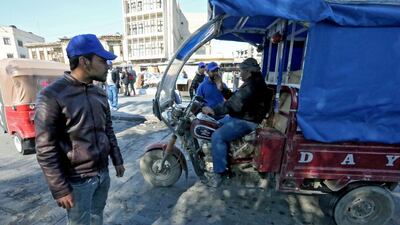Controversial Iraqi cleric Moqtada Al Sadr will dissolve his “blue cap” supporters unit after accusations levelled against them of carrying out deadly attacks on anti-government protests over the last week.
At least eight anti-government protesters were shot dead and 52 wounded in the clashes with blue caps Sadr followers in the southern city of Najaf on last Wednesday.
Mr Al Sadr initially threw his weight behind the five-month-old anti-government uprising but recently repositioned himself toward the political establishment after political elites selected Mohammed Allawi as prime minister-designate, a candidate he endorsed.
"I announce the dissolution of the 'blue caps,' and I do not accept the [Sadrist] movement's presence in and of itself at the protests, unless it is absorbed into them," Mr Al Sadr said in a tweet on Tuesday evening.
The cleric also said he was losing confidence in Prime Minister designate Mohammed Allawi and threatened to withdraw his support.
Mr Al Sadr said that “partisan and sectarian pressures” are interfering in the government formation process leading to a "lack of confidence" and “may even lead to declaring a disavowal” of Mr Allawi's candidacy.
Mr Allawi is a compromise candidate of rival blocs Sairoon led by Mr Al Sadr, and Fatah, which includes leaders associated with the paramilitary Popular Mobilisation Units headed by Hadi Al Amiri.
The prime minister designate has 30 days to form a government program and name ministers. Iraq's constitution requires that each candidate will have to be voted in by parliament. That effectively means both Sairoon and Fatah will have to consent to Mr Allawi's Cabinet lineup.
The controversial cleric has issued often contradictory statements, calling on protesters to leave the streets before calling for them to return. The contradictory orders have exacerbated existing tensions between anti-government demonstrators and his followers, with some activists claiming Mr Al Sadr’s followers had threatened them to toe the cleric’s line or leave protest sites.
In his Friday sermon last week, Iraq’s most powerful Shiite cleric, Grand Ayatollah Ali Al Sistani, called for security forces to protect anti-government protesters.
Over 600 have been killed and tens of thousands wounded since the protests began in October against the government as people demanded an end to corruption and mismanagement.

